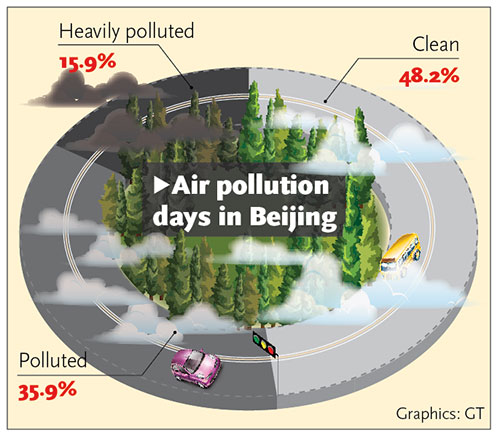Beijing suffered 189 polluted air days in 2013: environmental bureau

Graphics: GT
Beijing had 176 days with good air quality in 2013, and the density of major pollutant PM2.5 was about 2.5 times the national standard, the Beijing environmental bureau said on Thursday.
According to the bureau, the average density of PM2.5 in 2013 reached 89.5 micrograms a cubic meter, while the national standard for good air quality is 35, the Legal Mirror reported.
Beijing experienced the worst air quality days in the first quarter of last year, with the PM2.5 density even reaching 160 micrograms per cubic meter. Ten of the 16 worst-polluted days last year were in the first quarter. There were also 42 heavily polluted days last year.
PM2.5 has been the main pollutant in Beijing, contributing about 77.8 percent of polluted days, followed by ozone, 20.1 percent. But ozone pollutants mainly appeared from May to September.
According to 35 monitoring stations in the city, the PM2.5 density was much higher in the south of the city. The lowest was at Miyun reservoir and Badaling Great Wall with 60 micrograms per cubic meter, and the highest record was at Liulihe, Yongledian and Yufa, with 110 to 120 micrograms per cubic meter.
The city in 1998 began measuring sulfur dioxide, nitrogen dioxide and PM10. Monitoring results showed sulfur dioxide pollutants fell 5.4 percent, nitrogen dioxide rose 7.1 percent and PM10 dropped 0.9 percent year on year.
A bureau air quality official, Yu Jianhua, said sulfur dioxide fell 78 percent, nitrogen dioxide 24 percent and PM10 43 percent compared with 1998. Yu also noted that the city had to do more to meet new air quality standards, although the achievements made by the city nearly met the old standards.
Last week the Chinese Academy of Sciences published a report that industrial pollution was the major source of PM2.5, and vehicle emissions and garbage burning contributed 4 percent.
A bureau official responded Thursday that Beijing had more than 5 million vehicles consuming about 4 million tons of gasoline and 2 million tons of diesel fuel every year.
It was hard to believe these emissions contributed only 4 percent, he said.
Global Times